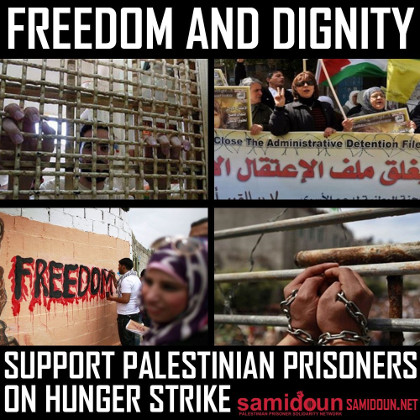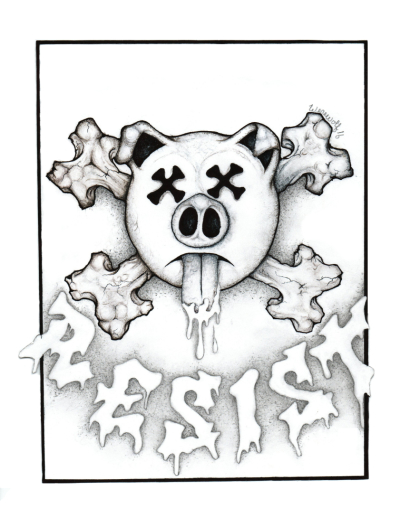[This letter is responding to the debate we printed in ULK 55: ”Debating Theory, Building Unity for September 9 Protests”]
Let me try to run through this as quick as possible. To the point yo. That original article in the ULK 50 was pretty half-assed. Admittedly, so was my response to it.
So, first lemme say that there were a few typos in my response that made some significant differences. Mainly I wanna be clear that it said I don’t care about your "lies." The correct word was "line."
Also, I have no fuckin clue what "Post-Fordism" could possibly mean. What the fuck is "Fordism"? I said "Post-Marxist". We live in a "Post-Marxist" era.
As for my acceptance of status quo definitions of "slavery", I don’t accept it simply because it's what is commonly presented to us, but because I more or less agree with it.
I do fully agree with your analysis concerning the exploited global proletariat as being the theoretical primary contradiction. Capitalist imperialism depends solely on expropriation of land and resources. In order to sustain capitalist rule this can only come as a result of perpetual expansion into foreign lands, etc., and not to mention wholesale slaughter of oppressed peoples across the globe. Imperialism being inherently nationalistic this means "global" class systems emerge and so there you see our analysis is virtually identical.
Now if you can explain to me how we can apply this dialectically correct analysis into revolutionary practice — aside from pencil-pushing while capitalism further secures itself by snowballing into a fascist state — sign me up. But in my studies of all revolutionary lines, I’ve yet to find a red theory that institutes practice in our current material time and place.
I’m a nihilist. I accept no theory/analysis simply because it’s common to any rev camp, but only if it jives with absolute objective and dialectically correct theo-analysis. I find red analysis to be exceptionally on point. But I find major flaws in dictatorships of any stripe based in historical evidence. Authority always shows to turn into tyranny. Communists are just as guilty of mass-murder and oppression as any fascist state and I find the differentiation between "nationalistic" socialism and so-called "international" socialism to be mostly a matter of semantics. Don’t get me started on Bolshevism being the theoretical root of fascism, evidenced by Hitler’s distribution of Leninist literature. So I’ll close this by saying red analysis is sound. But fundamentally anarchist methodology and principles are the only realistic road to a true egalitarian society. I don’t swallow this because of identity politics — be it the black flag or the red — but because it's true. And so I apply red analysis to anarchist principles.
Next, obviously I do recognize the importance of line as my writing clearly demonstrates. You make exactly the point of why it's important in your paragraph number five and others. When I say I don’t care about line, what I mean is that I don’t conform to any line simply because it’s a generally accepted body of politics. Though I will and do align myself with any line if it jives with my correct social analysis, theory, or mode of practice. In my case, red analysis, black theory (black meaning anarchist).
Obviously I’m also a big fan of theory. Marxist dialectics being the pinnacle of revolutionary science, this is my area of professionalism in fact. So, when I told you "your theory is based in theory", you omitted the first part of my statement which was that black theory is based in practice. So "anarchist theory is based in practice, red theory is based in theory." That was my statement, which demonstrates my ascription to theoretical science. I simply see no potential for practical application of red theory, and I’ve seen nothing from red camps that show otherwise.
Further, I say I don’t care about line, as in when I’m participating in any revolutionary campaign — not political agenda, but revolutionary campaign, which is different — I could really give a shit if you're a militant red or a backwoods biker for Christ. If you're with the business we’re crackin' off then I’ll ride in the same car with you. Do I dig your political line? That’s irrelevant during campaigns as long as our interests intersect on the immediate issues. This is also what Bakunin meant and myself when I quote him when he said in a letter to his sister "sometimes you have to throw theory into the fire for it only spoils life" — spoils, not "stalls" (another typo). We’re saying theory that cannot be applied, no matter how sound, is worthless. At that time he was still practicing Hegelian dialectics which is nihilistic in nature. And then he went and got himself a political agenda and became just as boring as Marx.
As I state in my original critique, your original article has a clear contradiction in your dudes' own analysis. The paragraph #5 and paragraph #10 directly contradict each other. But whatever. As I said, it was kinda half-assed and it's a mostly irrelevant point within all our other conversation on this shit. Ultimately I maintain my original statement on this which you neglected only to reiterate the same point which is that in refusing to participate in these pigs' exploitative practices, clearly I said "the P.I.C. will have to adjust to accommodate us." That does not even suggest a declaration that it will "close all prisons." For the record, I quoted a comrade from the Free Virginia Movement when I said that.
Lastly in my own personal defense of nihilism, I find red political agenda idealistic and historically and theoretically frightening and horrific. Be that as it may, I actually find anarchist ideas about some revolutionary end result of global economic syndications just as whimsical, and frankly unfavorable as any other systemic socio-economic structure. It's basically just another formula based around labor and industry and distribution of wealth and so on. It fails to bring into question the value and dependence of labor and production in itself. So ultimately it may be egalitarian in theory, which I align with in regard to revolutionary practice in our current socio-economic landscape, as we work from a decentralized organizational praxis. At the end of the day, the idea is to still be subject to industry, and so becomes somewhat mechanical and antithetical to the liberated spirit of the inherent animal nature of humanity. Further, any system, be it hierarchical like communism, or horizontal like anarchism, if it's a system designed to control the means of production, it is susceptible to corruption and a gradual development toward the control of humans by the worst part of other humans. In this case, the nihilist, rejecting all idealistic political theory, will be just as likely to attack and destroy anarchist syndicalism as she would any other system. That is, if it begins to be corrupted — which it would.
And so what this means for the nihilist is that we look forward to nothing but our cigarettes, our bitter coffee, and destruction.
I suppose I could go on and nit pick some more shit, but there's no point. I think we understand each other, and so I shall withdraw back into the black coils of my madness. Feel free to reawaken me for purposes of business or pleasure.
In the end, I hope I speak for everyone who gives a shit when I say I look forward to solidifying an alliance with you — as I’ve done before — for the coming tidal wave against the agony of oppression.
Face first in the fight for peace.
MIM(Prisons) responds: We appreciate Zero's willingness to continue the dialogue over our theoretical disagreements, and to build our practical unity in the struggle against oppression in which we do have much agreement. We want to reiterate that at this stage in the struggle, we have more unity with Zero and other anarchists than we have differences. We are all fighting to overthrow imperialism, and to take on that enemy we need a united front of all the enemies of the imperialist state. As Zero stresses that means uniting around the battles of the day, despite ideological differences.
There's no need to reiterate our responses to most of Zero's points, instead we want to take this opportunity to again comment on the theoretical debate over anarchism vs. communism and what's the best way to achieve liberation for the world's oppressed. As we've said before, anarchists and communists are fighting for the same end goal: a world where no group of people has power over any other group of people. Contrary to how Zero phrases it above, saying communism is hierarchical while anarchism is horizontal, anarchism is the communist's ultimate goal, we just disagree on how to get there. It is the getting-there process where communists believe in the use of force and repression of the oppressors.
This may seem like a theoretical and esoteric discussion that doesn't have much relevance to our day-to-day organizing. After all, we all know that right now the imperialists hold the power, and in the context of the prison struggle the criminal injustice system is a daunting and powerful enemy that we are all struggling against in many arenas. We aren't close to a revolutionary situation in the United $tates today, and so neither the communists nor the anarchists are in a position to seize power tomorrow. But this theory informs our practice in the struggle. Zero understands this and so stands firm in eir political positions, weaving them into eir discussion of the September 9th protests. In this we completely agree with Zero. In the long run this theory will determine whether or not (and how quickly) we are successful in overthrowing imperialism, which for many in the world is a life and death battle.
As scientists, we look to history to inform us about the most effective theory and strategy. Zero takes this same approach but draws different conclusions from eir study of history. We disagree with Zero's analysis that there isn't a significant distinction between communism and fascism (ey wrote: "the differentiation between 'nationalistic' socialism and so-called 'international' socialism to be mostly a matter of semantics.") Obviously Zero knows that fascism is an ideology that promotes the oppression of certain groups of people to the benefit of others, while communism promotes the end of oppression of groups of people. But studying the historical practice of communist revolutions we come to different conclusions from Zero. While capitalist propaganda tries to convince us that communists are brutal and murderous dictators, a careful study of Russian and Chinese history, from history books not written by capitalist apologists, demonstrates otherwise.
First we will state the obvious: neither the Russian nor the Chinese revolutions succeeded in implementing communism. Both reached a socialist state and then were overthrown by state capitalists from within. But during the years when they were implementing socialism and building towards communism, both countries made tremendous contributions to humynity. There are several important metrics we could look at here. To name just a few important ones: (1) Lives saved from feudalism/capitalism, i.e. people no longer starving to death, receiving health care, etc. (2) Lives saved from fascist and imperialist aggression, i.e. the Russian pivotal and central role in the defeat of Hitler and the fascists in World War II, the Chinese support for revolutionary movements around the world. (3) Advances made towards communism, i.e. the Chinese Cultural Revolution as a historical advance over the Russian implementation of socialism in terms of addressing the issues of corruption in socialist state structures through mass participation.
"The central problem with the critics of Stalin is that they do not understand the historical time period he lived in and the real-world choices that actually existed. Yes, he killed many people, too many even according to himself. However, all his repression combined was small compared with the lives he saved through the rapid and revolutionary transformation of society that he carried out. The choice the USSR had was not between liberal humyn-rights utopia on the one hand and tzarist era backwardness on the other. As if to drill this point into thick skulls, history has shown what happens after decades of criticism of Stalin: regression so that millions today are dying for lack of conditions that used to exist under Stalin almost 50 years ago! People supporting 'humyn-rights' and attacking Stalin are responsible for far more deaths than Stalin. That is evidence of the real world choices being faced — not between utopia and Stalin but between the pro-Western phony communists like Khruschev and Brezhnev and bourgeois politicians like Yeltsin on the one hand and Stalin on the road of Marxism-Leninism on the other hand. Stalin should be compared with other political leaders and then his merits will stand clear.
“Middle-class people from the West focus much too much on dissidents and not enough on causes of death such as food, clothing and basic medical care being lacking. Even including the repression he carried out, Stalin still doubled the life expectancy of his people. For this reason, polls of Russians on their favorite past leaders continue to show Stalin as the second most preferred leader of the past century, after Lenin. Although Amerikkkans love Lincoln more than Russians love Stalin, Stalin has a higher public acclaim than most U.S. presidents have amongst Amerikkkans, according to the survey by the Public Opinion fund cited in Pravda.” (From MIM Theory 6: The Stalin Issue)
Zero believes that humyn nature will inevitably lead to people seizing power for persynal gain if a state remains. In some ways Zero is correct. Zero's conclusion is similar to what Maoists say about the dangers of a new bourgeoisie arising within the party because of the strong history and remnants of capitalist culture. People don't just magically change overnight, and some will try to take advantage of opportunities to seize power and wealth even after a revolution. This is why the Chinese communists initiated the Great Proletarian Cultural Revolution: to encourage and foster the criticism of leadership by the people so that leaders who become corrupt will be exposed and removed.
Communists believe that people are conditioned by their environment. We have loads of historical evidence to support this. And so, like the anarchists, we believe that if we can build a society where all people are equal and all people's needs are met, and where the culture doesn't encourage violence and power grabbing, but rather fosters cooperation and kindness, people will learn and adapt into this more peaceful existence. But unlike the anarchists, we don't think this can be implemented overnight. We will need a period where we have a state to force the former-oppressor classes out of power and keep them from taking that power back. We call this state the dictatorship of the proletariat, because it is using the power of the state in the interests of the oppressed. And during this time we will also be fighting against new people trying to take and abuse power. During this period of cultural revolution we will be remaking the culture while we are transforming ourselves to think and work collaboratively, for the good of all of humynity. People won't just start doing this on a mass scale spontaneously; it will take a long period of struggle against the capitalist patriarchal culture. The Chinese communists made significant strides, but we must continue to do more and better.
For people interested in going deeper into these questions we recommend a few readings:
- There is an entire theory journal written by MIM in 1994 about Stalin, along with other relevant articles and reviews. Get MIM Theory 6.
- For a deeper look at the successes and failures of communism we recommend MIM Theory 4, a theory journal by MIM, but also we distribute many books by both communists and non-communists detailing their experiences and observations in revolutionary China which provide objective (non-bourgeois-propaganda) facts about the real successes and struggles in that country under Mao.
- We distribute several books and essays on the restoration of capitalism in the USSR and China for a more in-depth study of that history.






 Alabama
Alabama
 Alaska
Alaska
 Arizona
Arizona
 Arkansas
Arkansas
 Army Post
Army Post
 California
California
 Colorado
Colorado
 Connecticut
Connecticut
 Delaware
Delaware
 District of Columbia
District of Columbia
 Federal
Federal
 Florida
Florida
 Georgia
Georgia
 Guam
Guam
 Hawaii
Hawaii
 Idaho
Idaho
 Illinois
Illinois
 Indiana
Indiana
 Iowa
Iowa
 Kansas
Kansas
 Kentucky
Kentucky
 Louisiana
Louisiana
 Maine
Maine
 Maryland
Maryland
 Massachusetts
Massachusetts
 Michigan
Michigan
 Minnesota
Minnesota
 Mississippi
Mississippi
 Missouri
Missouri
 Montana
Montana
 Nebraska
Nebraska
 Nevada
Nevada
 New Hampshire
New Hampshire
 New Jersey
New Jersey
 New Mexico
New Mexico
 New York
New York
 North Carolina
North Carolina
 North Dakota
North Dakota
 Ohio
Ohio
 Oklahoma
Oklahoma
 Oregon
Oregon
 Pennsylvania
Pennsylvania
 Puerto Rico
Puerto Rico
 Rhode Island
Rhode Island
 South Carolina
South Carolina
 South Dakota
South Dakota
 Tennessee
Tennessee
 Texas
Texas
 Utah
Utah
 Vermont
Vermont
 Virginia
Virginia
 Washington
Washington
 West Virginia
West Virginia
 Wisconsin
Wisconsin
 Wyoming
Wyoming



